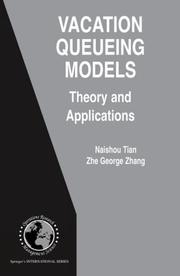| Listing 1 - 1 of 1 |
Sort by
|

ISBN: 0387337210 9780387337210 9780387337234 0387337237 9786611779320 1281779326 Year: 2006 Publisher: New York, NY : Springer US : Imprint: Springer,
Abstract | Keywords | Export | Availability | Bookmark
 Loading...
Loading...Choose an application
- Reference Manager
- EndNote
- RefWorks (Direct export to RefWorks)
A classical queueing model consists of three parts - arrival process, service process, and queue discipline. However, a vacation queueing model has an additional part - the vacation process which is governed by a vacation policy - that can be characterized by three aspects: 1) vacation start-up rule; 2) vacation termination rule, and 3) vacation duration distribution. Hence, vacation queueing models are an extension of classical queueing theory. Vacation Queueing Models: Theory and Applications discusses systematically and in detail the many variations of vacation policy. By allowing servers to take vacations makes the queueing models more realistic and flexible in studying real-world waiting line systems. Integrated in the book's discussion are a variety of typical vacation model applications that include call centers with multi-task employees, customized manufacturing, telecommunication networks, maintenance activities, etc. Finally, contents are presented in a "theorem and proof" format and it is invaluable reading for operations researchers, applied mathematicians, statisticians; industrial, computer, electrical and electronics, and communication engineers; computer, management scientists; and graduate students in the above disciplines.
Queuing theory --- 519.874 --- 519.8 --- Erlang traffic formula --- Queueing theory --- Theory of queues --- Waiting-line theory --- Production scheduling --- Stochastic processes --- 519.874 Theory of supplies and stock control. Inventory theory. Models of storage. Models of replacement --- Theory of supplies and stock control. Inventory theory. Models of storage. Models of replacement --- 519.8 Operational research --- Operational research --- Queuing theory. --- Mathematics. --- Production management. --- Operations research. --- Decision making. --- Computer organization. --- Computer science --- Mathematical models. --- Probabilities. --- Probability Theory and Stochastic Processes. --- Operation Research/Decision Theory. --- Mathematical Modeling and Industrial Mathematics. --- Mathematics of Computing. --- Computer Systems Organization and Communication Networks. --- Operations Management. --- Probability --- Statistical inference --- Combinations --- Mathematics --- Chance --- Least squares --- Mathematical statistics --- Risk --- Models, Mathematical --- Simulation methods --- Computer mathematics --- Discrete mathematics --- Electronic data processing --- Organization, Computer --- Electronic digital computers --- Deciding --- Decision (Psychology) --- Decision analysis --- Decision processes --- Making decisions --- Management --- Management decisions --- Choice (Psychology) --- Problem solving --- Operational analysis --- Industrial engineering --- Management science --- Research --- System theory --- Manufacturing management --- Industrial management --- Math --- Science --- Decision making --- Distribution (Probability theory. --- Computer science. --- Computer network architectures. --- Operations Research/Decision Theory. --- Architectures, Computer network --- Network architectures, Computer --- Computer architecture --- Informatics --- Distribution functions --- Frequency distribution --- Characteristic functions --- Probabilities --- Computer science—Mathematics.
| Listing 1 - 1 of 1 |
Sort by
|

 Search
Search Feedback
Feedback About UniCat
About UniCat  Help
Help News
News